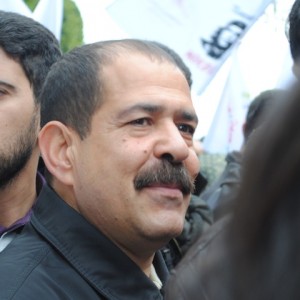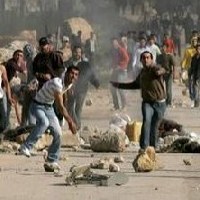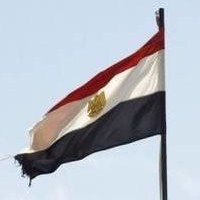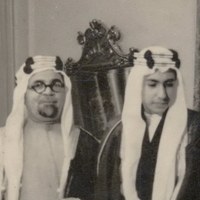![]()
Fri, February 8, 2013 | RubinReports | By Barry Rubin
“The only thing necessary for evil to triumph in the world is that good men do nothing.” — Edmund Burke
And if the good men are murdered by the forces of political evil than they certainly cannot do anything. Hence, the outcome is assured.
Thus, the “Arab Spring” has just been murdered with bullets and hijacked amid bloodstains.
Here is the list of countries in the Middle East area currently ruled by Islamists: Egypt, the Gaza Strip, Iran, Lebanon, and Turkey. Syria will probably join them soon. Qatar has a pro-Islamist policy. Morocco technically has an Islamist government though the king neutralizes it in practice. Saudi Arabia is ruled by a strict Islamic regime but opposes the revolutionary Islamists though its money often spreads their doctrines elsewhere. Everyone is being forced into Sunni or Shia Islamist camps, backing radical forces in other countries so that their religious allegiance can conquer.
In this situation, only in Tunisia could the non-Islamists win fairly conducted elections. But an election isn’t fair if one side uses violence to ensure its victory and its ability to transform the country into a social-political dictatorship afterward.
I know that whenever I write an article on Tunisia it will have fewer readers than other topics. That’s understandable from the standpoint that Tunisia is a small country with little international impact and limited U.S. interests.
Yet Tunisia was the country where the “Arab Spring” began. And Tunisia is going to be the place where the Middle Eastern equivalent of the Spanish Civil War will be fought. In other words, it is the only place where moderate and “secularist” forces are going to fight and the only country where the moderates have a majority of the population — though not a majority of the guns — behind them.
Given that bellwether factor, they have just suffered a massive defeat which is simultaneously a major victory for the Islamist forces.
Briefly, what people who believe the Arabic-speaking world is heading toward democracy don’t understand is that they have helped unleash forces quite willing to engage in violence and that will not stop until they’ve achieve a total triumph. It’s sort of like Pandora who opened the box to unleash its spiritual whirlwinds and said, “This ought to be interesting!”
That’s why the assassination of Choukri Belaid is so important. He was leader of the Democratic Patriot party and a leader of the Popular Front opposition coalition. While the story will be obscure in the West it is devastating for Tunisia, the Arab liberals, and the future of the region. Belaid was the single most outspoken and determined anti-Islamist leader in the country, and indeed the most important openly anti-Islamist politician in the entire Arabic-speaking world. He wasn’t the only moderate politician in Tunisia but he was the main one who rejected Islamist rule and warned against Islamist intentions.
And how did the Islamist-dominated coalition react? The moment the leading opposition figure — the man around whom an anti-Islamist coalition might have been built following the next elections — was murdered it called for new elections.
Get it? The Brotherhood’s moderate coalition partners didn’t want elections now. And if you eliminate the tough moderate those remaining may be more pliable about caving in. It was quite conceivable that the non-Islamists would get a majority in the next elections — as they did in the previous one. But a majority divided among four parties isn’t enough. Last time, the moderate parties got 60 percent but their disunity allowed the largest single party, the Brotherhood, to take control of the government coalition with only 40 percent of the vote.
But a man like Belaid might have forged a moderate coalition government that would keep the Brotherhood out of power. In other words, though he led only the fourth largest party, Belaid was the key to forcing the Brotherhood out of power by convincing the four moderate parties to work together against the Islamist threat. His elimination isn’t just a crime, its a political strategy.
As I predicted a few days ago, destroying the left is going to be the Islamists’ priority and Tunisia is the only country where the political left poses a danger to them. Elsewhere it is too weak, confined to isolated individuals and publications.
Some decades ago, the killing of a left-wing leader by what Marxists would have called “clerical-fascist” forces would have provoked an outcry from the Western left. Nowadays, they don’t even blink — as we also saw in Iran — unless some misdeed can be blamed on the United States or Israel.
While Belaid stood firm, the two other main moderate parties were willing to try working with the Muslim Brotherhood, Belaid said “no” and warned — just as we have — that the Islamists were determined to create a dictatorship. He was the man to kill, an event which also has an intimidating effect on the other moderates.
As Belaid’s brother put it: the killing was “a clear message to Tunisians….Shut up or we kill you.”
I don’t think the assassination was the result of a high-level conspiracy and especially not from the Brotherhood itself. Most likely, it was done by a small Salafist group.
But that’s the point. The Obama Administration views the Brotherhood as the bulwark against the Salafists. In fact, it is their big brother, often using the Salafists as shock troops to attack Western embassies, oppositionists, secularists, moderates, churches, and women who seek equality.
Ideally when the leader is going to be murdered the masses stand up and say, “I am Spartacus.” In reality, particularly in countries with anti-democratic political cultures, it doesn’t happen that way. Even if the four moderate parties do well in elections they still have to cooperate, having to face a wave of Salafist violence, too.
Now if the Tunisian army were to stage a coup that would make a difference. But what do you think would happen if the generals went to the U.S. embassy and asked for America’s support to overthrow the Brotherhood? In Egypt, we do see a sort of uprising against the regime. But without the army’s support it doesn’t seem to have a chance of taking power. Still, one must keep an open mind and see what happens.
Yet few in the West will be aware that Belaid is the second moderate opposition leader killed in Tunisia during the last three months in Tunisia. During decades of Arab nationalist dictatorship Tunisia-style, murder was rarely employed.
The Islamists have no such inhibitions. They are the people to be afraid of. Consider that in Libya, the most obvious American client in the Arabic-speaking world, there’s no hint of arresting anyone for the murder of the U.S. ambassador and three American officials which happened five months ago! Don’t hold your breath.
A similar strategy to what has just happened in Tunisia took place in Lebanon a few years ago, where the Syrians and their Hizballah and other local allies murdered opposing parliamentarians, journalists, and judges until they came close enough to a legislative majority and to intimidating critics that they won the election and currently form the Lebanese government.
And what about Syria where Islamists are headed for power with America’s blessing? Or Washington where the main lobbyist for supporting the Brotherhood is becoming head of the CIA? And what about Egypt where dozens of demonstrators have been murdered by the Muslim Brotherhood regime as the West still proclaims that government’s democratic credentials, the international institutions negotiate the supply of billions of dollars and the United States sends advanced fighter planes and tanks as gifts?
The tide is only going in one direction and Obama’s policies are raising, not lowering, these sea levels.
Barry Rubin is director of the Global Research in International Affairs (GLORIA) Center and editor of the Middle East Review of International Affairs (MERIA) Journal. His latest book, “Israel: An Introduction“, has just been published by Yale University Press. Other recent books include “The Israel-Arab Reader” (seventh edition), “The Long War for Freedom: The Arab Struggle for Democracy in the Middle East” (Wiley), and “The Truth About Syria” (Palgrave-Macmillan). The website of the GLORIA Center and of his blog, Rubin Reports. His original articles are published at PJMedia.



 RSS
RSS











[…] It is now clear, after the assassination of the leading anti-Islamist politician that his murder was freely discussed as desirable beforehand at the highest levels of the […]